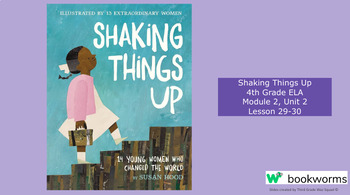"Shaking Things Up #1" Google Slides- Bookworms Supplement
Third Grade Waz Squad
64 Followers
Grade Levels
4th
Subjects
Resource Type
Standards
CCSSRL.4.1
CCSSRL.4.2
CCSSRL.4.3
CCSSRL.4.4
CCSSRL.4.5
Formats Included
- Google Slides™
Pages
26 pages
Third Grade Waz Squad
64 Followers

Made for Google Drive™
This resource can be used by students on Google Drive or Google Classroom. To access this resource, you’ll need to allow TPT to add it to your Google Drive. See our FAQ and Privacy Policy for more information.
Also included in
- Bookworms Curriculum Supplement: 4th grade ELA Module 2: Unit 1- The Mysteries of Friendship and Unit 2- Tracking Relationships. These slides are for lessons 1-40. They correlate with the books: "Blood on the River", "Worst of Friends", "Shaking Things Up", and "My Life in Dog Years". These resourcePrice $35.00Original Price $38.00Save $3.00
Description
Bookworms Curriculum: 4th grade ELA: Module 2- Unit 2: Tracking Relationships (Lessons 29-30). These lessons correlate with the book "Shaking Things Up" by Susan Hood.
This resource is completely editable through Google Slides. This resource includes modeling slides, timers when appropriate, discussion questions, "I can" statements, success criteria, rubrics, checklists, storybook photos, turn and talks, and anchor chart guides. Please know that these are for the Bookworms Curriculum and the slides were created to help with planning and presentation to young students! They are kid friendly slides to help with engagement during instruction.
Access the full curriculum, supporting tools, and educator communities at openup.org.
Total Pages
26 pages
Answer Key
N/A
Teaching Duration
45 minutes
Report this resource to TPT
Reported resources will be reviewed by our team. Report this resource to let us know if this resource violates TPT’s content guidelines.
Standards
to see state-specific standards (only available in the US).
CCSSRL.4.1
Refer to details and examples in a text when explaining what the text says explicitly and when drawing inferences from the text.
CCSSRL.4.2
Determine a theme of a story, drama, or poem from details in the text; summarize the text.
CCSSRL.4.3
Describe in depth a character, setting, or event in a story or drama, drawing on specific details in the text (e.g., a character’s thoughts, words, or actions).
CCSSRL.4.4
Determine the meaning of words and phrases as they are used in a text, including those that allude to significant characters found in mythology (e.g., Herculean).
CCSSRL.4.5
Explain major differences between poems, drama, and prose, and refer to the structural elements of poems (e.g., verse, rhythm, meter) and drama (e.g., casts of characters, settings, descriptions, dialogue, stage directions) when writing or speaking about a text.






